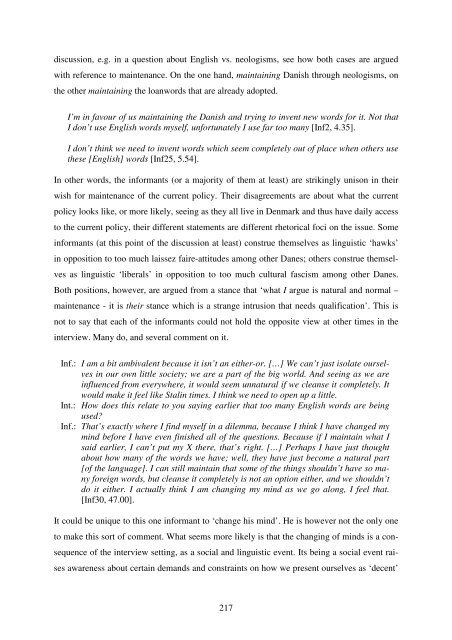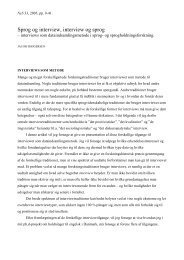Hør dog hvad de siger - Note-to-Self: Trials & Errors
Hør dog hvad de siger - Note-to-Self: Trials & Errors
Hør dog hvad de siger - Note-to-Self: Trials & Errors
Create successful ePaper yourself
Turn your PDF publications into a flip-book with our unique Google optimized e-Paper software.
discussion, e.g. in a question about English vs. neologisms, see how both cases are argued<br />
with reference <strong>to</strong> maintenance. On the one hand, maintaining Danish through neologisms, on<br />
the other maintaining the loanwords that are already adopted.<br />
I’m in favour of us maintaining the Danish and trying <strong>to</strong> invent new words for it. Not that<br />
I don’t use English words myself, unfortunately I use far <strong>to</strong>o many [Inf2, 4.35].<br />
I don’t think we need <strong>to</strong> invent words which seem completely out of place when others use<br />
these [English] words [Inf25, 5.54].<br />
In other words, the informants (or a majority of them at least) are strikingly unison in their<br />
wish for maintenance of the current policy. Their disagreements are about what the current<br />
policy looks like, or more likely, seeing as they all live in Denmark and thus have daily access<br />
<strong>to</strong> the current policy, their different statements are different rhe<strong>to</strong>rical foci on the issue. Some<br />
informants (at this point of the discussion at least) construe themselves as linguistic ‘hawks’<br />
in opposition <strong>to</strong> <strong>to</strong>o much laissez faire-attitu<strong>de</strong>s among other Danes; others construe themsel-<br />
ves as linguistic ‘liberals’ in opposition <strong>to</strong> <strong>to</strong>o much cultural fascism among other Danes.<br />
Both positions, however, are argued from a stance that ‘what I argue is natural and normal –<br />
maintenance - it is their stance which is a strange intrusion that needs qualification’. This is<br />
not <strong>to</strong> say that each of the informants could not hold the opposite view at other times in the<br />
interview. Many do, and several comment on it.<br />
Inf.: I am a bit ambivalent because it isn’t an either-or. […] We can’t just isolate ourselves<br />
in our own little society; we are a part of the big world. And seeing as we are<br />
influenced from everywhere, it would seem unnatural if we cleanse it completely. It<br />
would make it feel like Stalin times. I think we need <strong>to</strong> open up a little.<br />
Int.: How does this relate <strong>to</strong> you saying earlier that <strong>to</strong>o many English words are being<br />
used?<br />
Inf.: That’s exactly where I find myself in a dilemma, because I think I have changed my<br />
mind before I have even finished all of the questions. Because if I maintain what I<br />
said earlier, I can’t put my X there, that’s right. […] Perhaps I have just thought<br />
about how many of the words we have; well, they have just become a natural part<br />
[of the language]. I can still maintain that some of the things shouldn’t have so many<br />
foreign words, but cleanse it completely is not an option either, and we shouldn’t<br />
do it either. I actually think I am changing my mind as we go along, I feel that.<br />
[Inf30, 47.00].<br />
It could be unique <strong>to</strong> this one informant <strong>to</strong> ‘change his mind’. He is however not the only one<br />
<strong>to</strong> make this sort of comment. What seems more likely is that the changing of minds is a con-<br />
sequence of the interview setting, as a social and linguistic event. Its being a social event rai-<br />
ses awareness about certain <strong>de</strong>mands and constraints on how we present ourselves as ‘<strong>de</strong>cent’<br />
217



